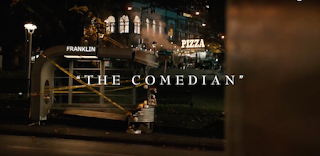TWIST: "The Comedian" Brings the Twilight Zone Home
 Submitted for your approval: CBS All Access attempting the impossible, again--to resurrect a classic television series, update it, and use it as a cornerstone in nothing less than the battle for TV's future.
Submitted for your approval: CBS All Access attempting the impossible, again--to resurrect a classic television series, update it, and use it as a cornerstone in nothing less than the battle for TV's future. In a certain sense, reviving The Twilight Zone is a task far more daunting than resuming Star Trek; with the latter, the label never really had gone away... it simply went on a little hiatus after successive successful (well, varyingly successful) cycles had been found in every decade since the 1960s. Attempts to revisit The Twilight Zone have been met with, curiously, Zone-esque levels of disaster, be it the chintzy 2000s revival (theme reinterpreted by the singer from Korn), the unmemorable restart in the 1980s (theme reinterpreted by the Grateful Dead), or the literal disaster of Twilight Zone: The Movie (with three tragic, unconscionable deaths during production).
2019's "The Comedian" represents the best possible start to a series that hopes to be a continuation of Rod Serling's series which CBS has breathlessly called--perhaps without hyperbole--"the most iconic series of all time." Kumail Nanjiani, the successful comic and Oscar-nominated writer, stars as Samir, an unsuccessful standup comedian. The premise of the episode is, as with many episodes of Serling's version, simple enough to pitch: Samir makes a deal with... retired comedian JC Wheeler? Or the metaphorical devil? Or the literal devil?... all to be able to get all the laughs on stage.
A twist comes early, when it's revealed that each personal joke made by Samir--the first being about his dog--comes at the expense of the subject being winked out of the universe, permanently so. Indeed, it seems no one remembers the people (and dog) ever having existed, even right after the jokes made at their expenses.
Serling's version of the show would have made quick work of such a premise, given that episodes in the 1950s and 1960s ran with about 25 minutes of content. (Those enjoying episodes in syndication should watch out for the fullest episodes found on streamers and home video.) The runtime of "The Comedian," at over 50 minutes, might initially give the viewer nervous flashbacks to the uneven fourth season of Serling's series, comprised of hour-long episodes. (Take, for example "The New Exhibit," in which wax figures come to life--and kill! Then kill again. And... again.) Yet "Comedian" writer Alex Rubens uses the episode's space perfectly.
A seductive, silky story unfolds: we are first mildly horrified at Samir's power to zap away people (and a dog) in exchange for laughs. Yet when he turns to go after the all-but-objectively bad (a fellow comedian whose drunk driving killed two, a high school coach guilty of abuse, and so forth), it seems to be not all that bad to "undo" such people. Indeed, as Samir notes with the now-never-existed drunk driver, Samir's jokes have now saved two lives. (That Samir jokes about a particular president in a particular way shan't be discussed here, for much the same reasons that Samir notes in the episode.)
However, the list of truly ("truly?") bad people who have direct connection with Samir becomes a dwindling list, and it is here that Tracy Morgan's JC Wheeler returns. In Wheeler's first scenes, there was an aura of smoke--attributable to a subtle if not obnoxious hookah vape monstrosity; upon his return he breathes the smoke, solidifying in the viewer's mind Wheeler's devilish, Faustian presence, hammering home this deal with a devil, if not The Devil himself.
The episode ends, initially, perhaps a bit predictively. The Twilight Zone, at its best, presents a mystery box so intricate that it cannot be guessed, yet so simple that the revelation makes instant sense. That Samir's final joke will be about himself around the 50-minute mark made a good guess at the 25-minute mark (either that, or he, what... goes on to rule the ever-shrinking world?). Here, Nunjiani pours the self-misery of Samir's loathsome existence into his final set being his biggest laughs, his biggest jokes, and his self-inflicted end.
A second twist exists, though--one that offers the audience a modicum of justice not offered up by the original first episode (or, at least, first produced episode, "Nightmare at 30,000 Feet"). Somewhere else, an alternate reality, or the place (cornfield?) that Samir's banished go, sits JC Wheeler, offering advice to another comic in a world without Samir. The closing shots, borrowing liberally from The Shining, show that the wallpaper at the rear of the theater, showing a full-scale audience, now include Samir. The implication is that every face shown on the wall has gambled and lost with Wheeler's Devil.
The episode, using a muted color palate and nighttime setting, is directed by Owen Harris in a way that seems to mimic without mirroring the black and white of the original series. As for co-re-creator and narrator Jordan Peele, his presence in the first half of the episode shows laid-back electricity, declaring that The Twilight Zone is back. His somewhat quiet conclusion reveals, perhaps, a creative figure grappling with what he's just undertaken: walking in the shoes of the vaunted, unequaled Rod Serling.
Nonetheless, despite imperfection (and indeed, all but a few of the original Twilight Zone are truly flawless), "The Comedian" brings out the very best of the concept--and best of all, it brings The Twilight Zone home.
Comments
Post a Comment